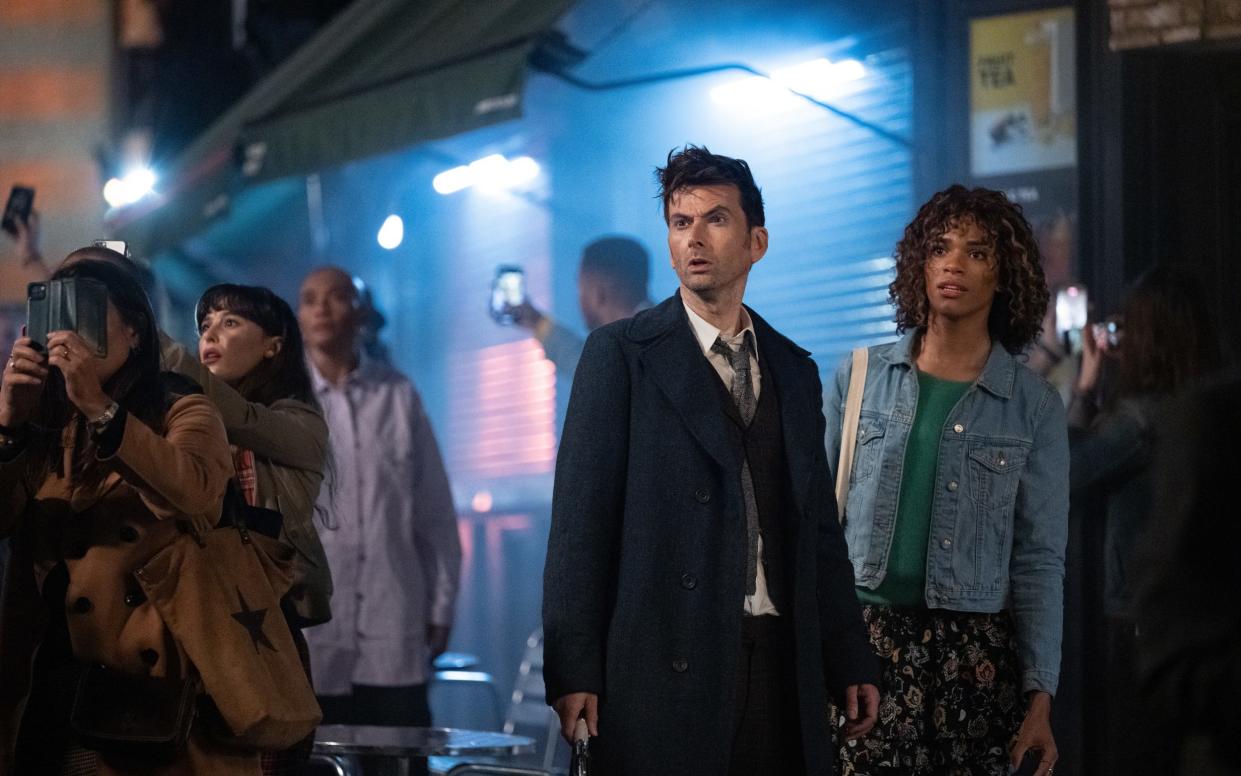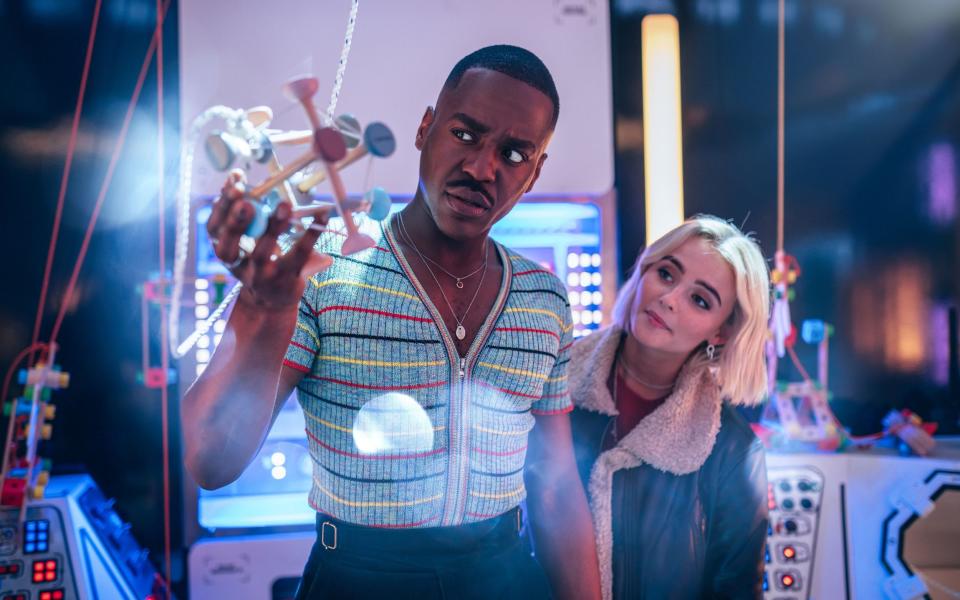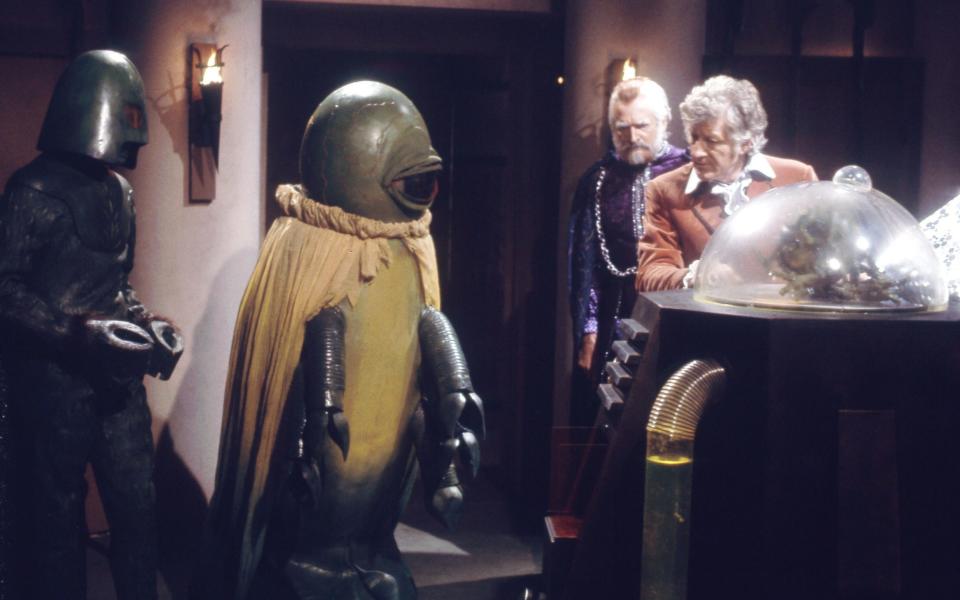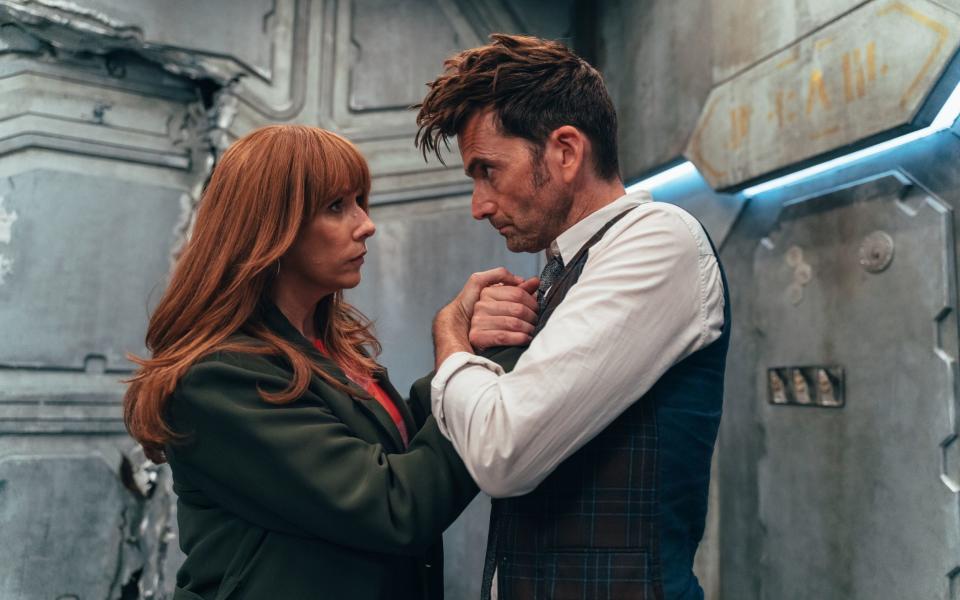How Doctor Who went from paternalistic liberal to woke warrior

- Oops!Something went wrong.Please try again later.
- Oops!Something went wrong.Please try again later.
What has happened to Doctor Who? Of late, there’s been a flurry of irritable reviews about Russell T Davies’s triumphantly expensive return to the Tardis, complaining about the show’s crowbarred-in references to genocide, refugees, gender pronouns and transgenderism. What is with this barrage of political correctness being hurled at our kids?
In some ways, it is business as usual – Davies has played with gender and sexuality across his entire career, and definitely since resurrecting Doctor Who in 2005. Captain Jack Harkness, played by the now unmentionable John Barrowman, stormed into Davies’s first season as a bisexual troublemaker who snogged Billie Piper’s Rose and Christopher Eccleston’s Doctor in the same episode. Captain Jack spin-off Torchwood saw every major character have some sort of non-heterosexual relationship.
After that, characters such as Bill Potts (gay), Madame Vastra and Jenny Flint (married Victorian lesbians), and Clara Oswald (bisexual) took the baton on. It all meshed smoothly, few people complained, and the nation got on with its Saturday evening teatime viewing entirely unruffled.
But suddenly it’s all started to feel a little clunky. In last year’s 60th anniversary special, a transgender character, Rose (played by Yasmin Finney), saved the day because she was non-binary, and in the second of the weekend’s double-bill, The Devil’s Chord, American drag artist Jinkx Monsoon appeared from inside a piano and admonished a fusty music teacher to use the pronoun “them”.
It’s tempting to think that Davies is looking for an outraged reaction. At a preview screening for his 2023 comeback he was asked about the possible press response to Finney, prompting him to rail against “newspapers of absolute hate and venom and destruction and violence who would rather see that sort of thing wiped off the screen and destroyed. Shame on you”.

This week he gave an interview in which the journalist pointed out that one of the papers Davies had in mind had given the episode a five-star review. Was he annoyed? “Very annoyed,” he said. “I’m sure it won’t last.”
The Welshman has claimed that “anti-queer thinking is on the rise.” Possibly. But not in Doctor Who. In the 1960s, Max Adrian’s King Priam and Derren Nesbitt’s leather-clad Tegana were clearly gay. There was a lesbian subtext to Ace and Karra in the 1980s. A thinly disguised Alan Turing showed up in the Curse of Fenric (1989). Admittedly, Alpha Centauri, the hermaphrodite one-eyed alien from the Jon Pertwee era, looked a little too much like a giant green penis to make any kind of statement beyond “are you pleased to see me?”. There’s a reason Doctor Who has a large LGBTQ+ following.
And there’s a reason storylines about refugees, genocide, poverty, evil empires and all the other political topics from the recent episodes fit neatly into Doctor Who - it’s always had messages. Take the piece from The Spectator which denounced the show’s “politics” and complained about “a growing tendency on the part of the Doctor to moralise tediously about peace, love, and brotherhood”, and citing the Doctor’s “ludicrous enthusiasm for ecological cranks”. That was written in 1973.
As Tony Jordan, the 64-year-old co-ordinator of the Doctor Who Appreciation Society, says over the phone: “People who complain that Doctor Who is too progressive either haven’t seen it or else they haven’t watched it for a very long time, and they’ve forgotten what the show is like.”

“Doctor Who has always been at the cutting edge of progressive viewpoints,” he points out. “The very first episode in 1963 was produced by a Jewish woman in her late 20s and directed by a gay Asian man. Whenever the front pages get overexcited about, say, the Doctor becoming a woman, real fans just sigh.”
The Doctor’s first great baddies, the Daleks, were created by Terry Nation in imitation of the Nazis – violent, merciless, devoid of emotion other than hate, demanding the extermination of all inferior forms of life. While that could also be a reference to Twitter, the point is it was only Doctor Who’s second storyline. The show has stayed solidly anti-Nazi ever since.
Indeed, the Doctor Who team was just getting started. Environmentalism. Anti-imperialism. The death penalty. Racism. Strikes. Joining the EEC. And Happiness Patrol in 1988 was a blatant parody of Thatcherism with Sheila Hancock playing the Iron Lady. Always, in every incarnation, the Doctor wrestles with genocide. The Doctor causes it. The Doctor defeats it. The Doctor struggles with the power to commit it.
The truth is, the Doctor is a One Nation Tory, bestowing his ideas of kindness across the universe by any means necessary. “Doctor Who has generally been both gently progressive and vaguely establishment in tone,” explains Jonn Elledge, journalist, fan and author of A History of the World in 47 Borders. “As well as fighting monsters, the Doctor overthrows tyrants and fights evil empires, but historically did so in the guise of a vaguely patrician man who went to a sort of space Oxbridge.”
Elledge cites a handful of stories you could call right-wing – including The Dominators (1968) and The Sun Makers (1977) – and points to Pertwee, a posh chap in a velvet smoking jacket whose best mate is a brigadier. Very patrician.
“And yet,” says Elledge, “the stories are generally about the environment or post-imperial angst or the need to fight Little Englanders, and many of Pertwee’s best stories were written by the self-professed communist Malcolm Hulke.”
In certain respects, Doctor Who is ideally suited for the world of cancel culture. The show’s progressive attitude comes from a particular place – the idea that the Doctor is always right. I recently interviewed former showrunner Steven Moffatt, who said “if the Doctor were a real person, you’d be terrified of him. He’s running into the middle of every fight he can find and deciding who should win. The Doctor espouses all the hippy, dippy, liberal shit, but basically says - you get one chance to do what I say and then I exterminate your entire species. I’m the Doctor, and that’s what I do.”

And this is where the new show has come unstuck. In the 60th anniversary special, where Donna (Catherine Tate) survives total destruction thanks to her daughter, Rose, being transgender – something to do with combining both male and female energies; Davies has always been great on concepts but hazy on detail – Donna and Rose tell the Doctor that he doesn’t understand letting go of power because he’s “male-presenting”.
This didn’t work. If you want to get technical, the Doctor has already transitioned, and then transitioned back. The Doctor is an alien being that doesn’t conform to gender. And like the prophet Tiresias he knows how everything works. The issue felt tacked on, like somebody straining hard to be progressive.
That’s where Doctor Who’s clunky gender stuff struggles. And it shouldn’t. We are living in the TV world that Russell T Davies made. When Queer as Folk came out, even The Guardian was offended. But the show began a revolution that led to shows like The Long Call, a recent primetime ITV detective show featuring a gay married cop whose biggest problem was the crime he was trying to solve.
Davies said this week: “The polarising of the [transgender] argument is the problem: it’s shouting and screaming. The language is vile on both sides. And for intelligent people, there’s got to be a middle ground.” Doctor Who has always held that middle ground. But recent episodes have hinted that the show is in danger of joining in the shouting and screaming.

